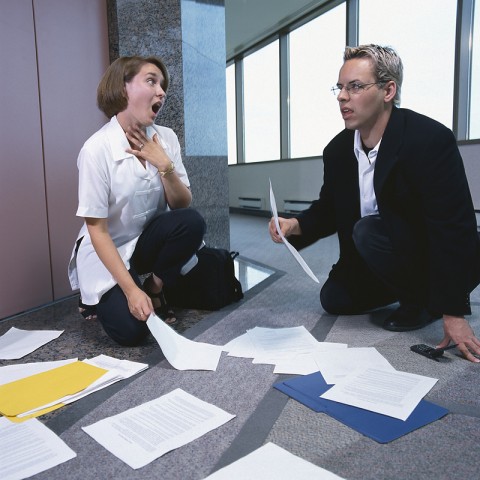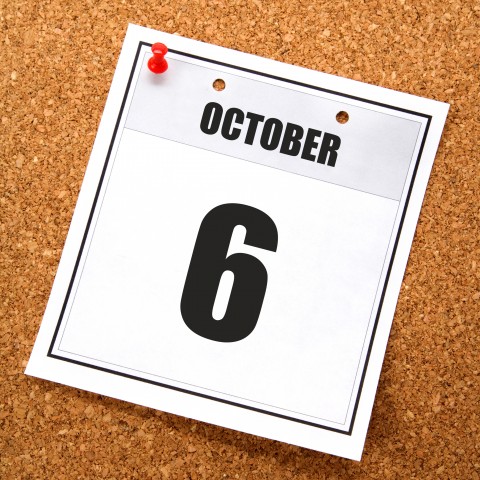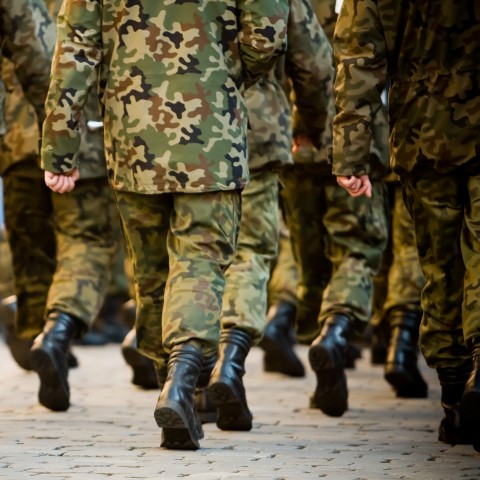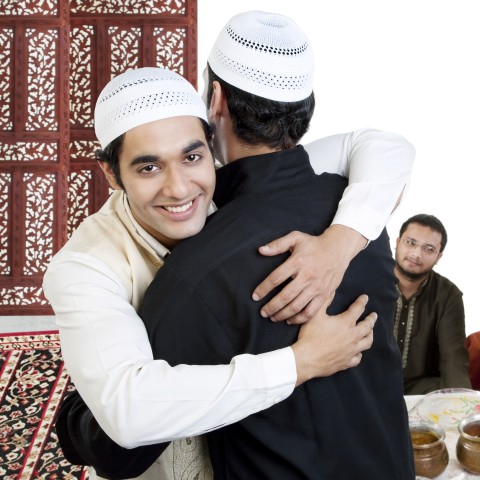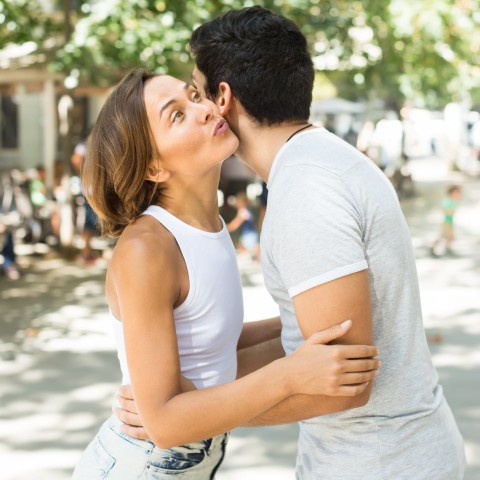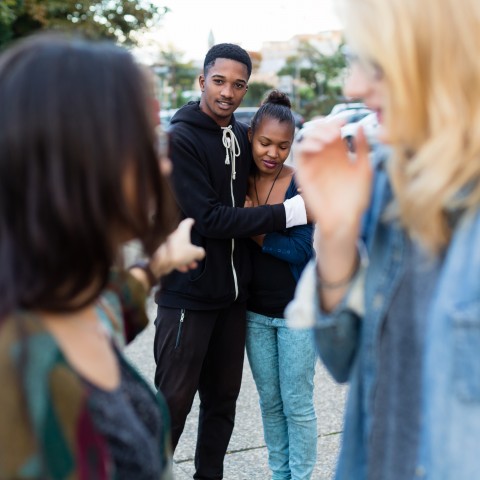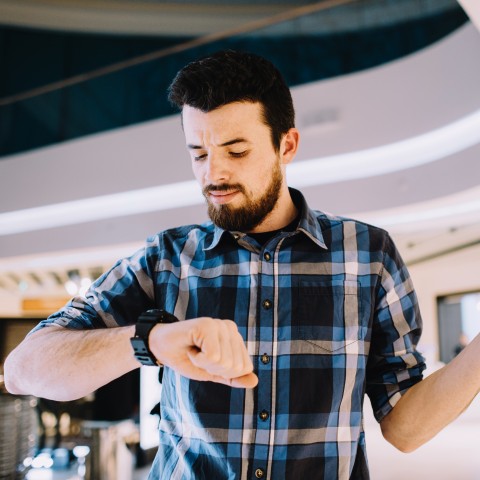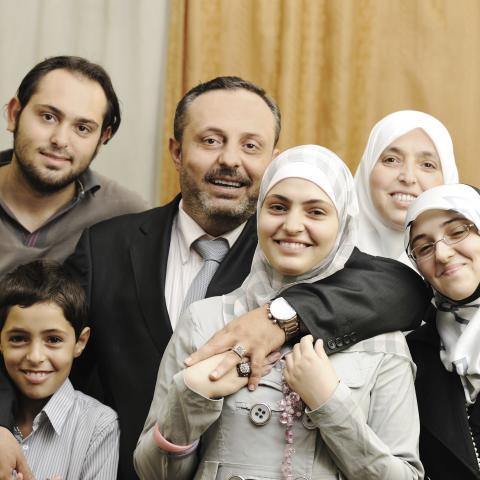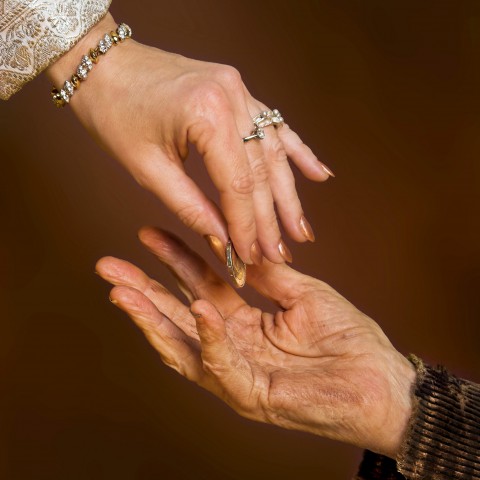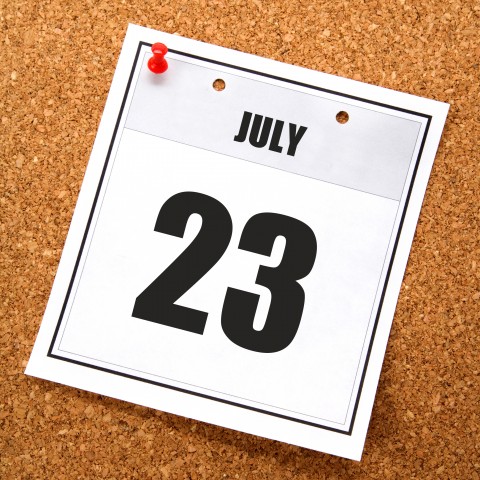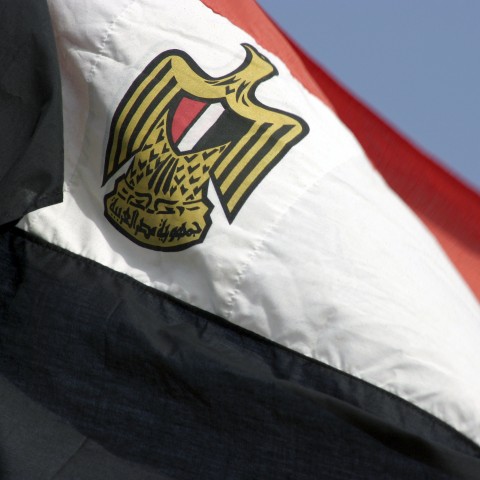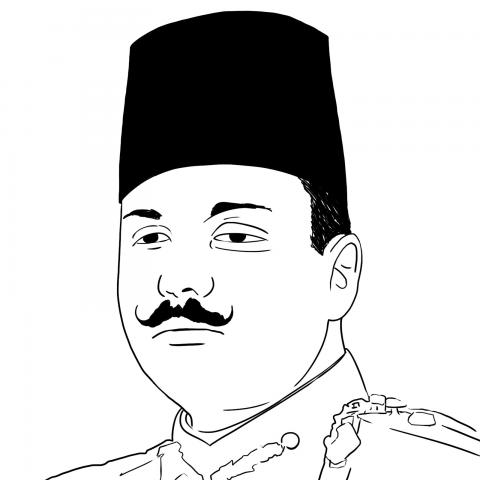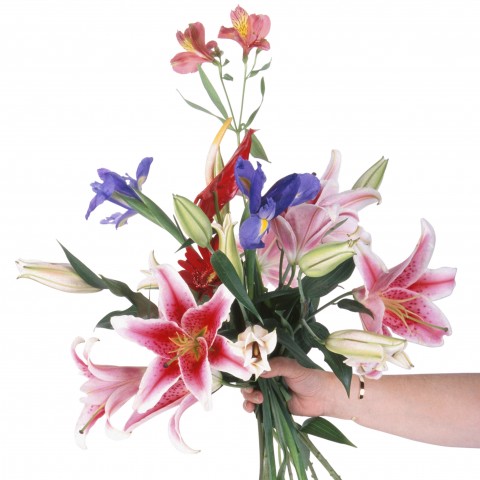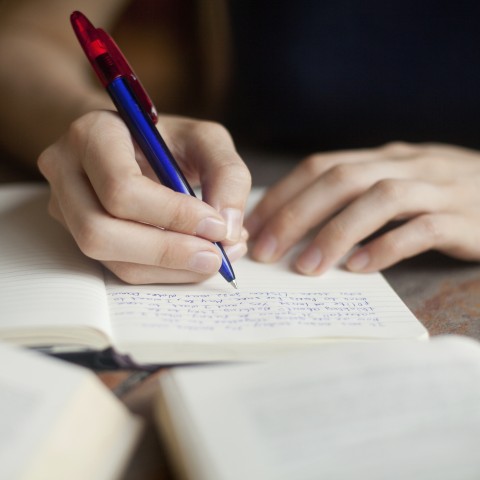You’re learning to speak Arabic, and it’s going well. Your confidence is growing! So much so that you feel ready to share your experiences on social media—in Arabic.
At Learn Arabic, we make this easy for you to get it right the first time. Post like a boss with these phrases and guidelines, and get to practice your Arabic in the process.

1. Talking about Your Restaurant Visit in Egyptian Arabic
Eating out is fun, and often an experience you’d like to share. Take a pic, and start a conversation on social media in Arabic. Your friend will be amazed by your language skills…and perhaps your taste in restaurants!
ʾAmīr eats at a restaurant with his friends, posts an image of it, and leaves this comment:
POST
Let’s break down ʾAmīr’s post.
باكل في مطعم جديد في المعادي. (bākul fī maṭʿam ǧedīd fī el-maʿādī.)
“Eating out at a new restaurant in Maadi.”
1- باكل في مطعم جديد (bākul fī maṭʿam ǧedīd)
First is an expression meaning “Eating out at a new restaurant.”
Since there isn’t a definite article at the beginning of the phrase “new restaurant,” it’s implied that it’s an indefinite noun. You can add the definite article “el” for both words to specify a certain restaurant.
2- في المعادي (fī el-maʿādī.)
Then comes the phrase – “in Maadi.”
Maadi is one of the most popular areas amongst young people in Cairo. It has a lot of good restaurants and cafes.
COMMENTS
In response, ʾAmīr’s friends leave some comments.
1- مقلتليش ليه يا خاين! (maʾuletlīš līh yā ḫāyen!)
His college friend, Sīf, uses an expression meaning – “Why didn’t you tell me, you traitor!”
Use this expression to show, in passionate way, that you feel left out.
2- حلو؟ (ḥelū?)
His girlfriend’s high school friend, Šīrīn, uses an expression meaning – “Is it good?”
Ask this question if you would like to know more about the poster’s experience, and want to make conversation.
3- أسعارهم عاملة إيه؟ (ʾasʿārhum ʿāmlah ʾeīh?)
His high school friend, Sārah, uses an expression meaning – “How are the prices over there?”
This is another question about the restaurant that could keep the conversation rolling.
4- إللي ياكل لوحده يزور يا أمير! (ʾellī yākul lewaḥduh yezwar yā ʾamīr!)
His girlfriend’s nephew, Sāmī, uses an expression meaning – “You’ll choke on food if you eat alone, ʾAmīr! (an Egyptian proverb)”
This comment uses a bit of cynicism, together with humour that could indicate that you feel excluded. The proverb means it’s more charitable, and probably more enjoyable to share food.
VOCABULARY
Find below the key vocabulary for this lesson:
So, let’s practice a bit. If a friend posted something about having dinner with friends, which phrase would you use?
Now go visit a Arabic restaurant, and wow the staff with your language skills!
2. Post about Your Mall Visit in Egyptian Arabic
Another super topic for social media is shopping—everybody does it, most everybody loves it, and your friends on social media are probably curious about your shopping sprees! Share these Arabic phrases in posts when you visit a mall.
Munā shop with her sister at the mall, posts an image of the two of them in a clothes shop, and leaves this comment:
POST
Let’s break down Munā’s post.
بشتري هدوم مع أحلى صحاب. (bašterī hdūm maʿ ʾaḥlā ṣuḥāb.)
“Buying clothes with the best friends ever.”
1- بشتري هدوم (bašterī hdūm)
First is an expression meaning “Buying clothes.”
This is a very short expression in the Egyptian dialect meaning that you’re buying clothes.
2- مع أحلى صحاب (maʿ ʾaḥlā ṣuḥāb.)
Then comes the phrase – “with the best friends ever.”
This expression, meaning “the best friends ever,” is usually used by girls on social media, often with heart emoticons after.
COMMENTS
In response, Munā’s friends leave some comments.
1- كفاية خروج و روحي ذاكري! (kefāyah ḫurūǧ wa rūḥī ḏākrī!)
Her supervisor, Murād , uses an expression meaning – “Enough going out! Go home and study!”
Use this expression if you’re old fashioned and want to sound like a teacher or a parent.
2- بقالي كتير منزلتش أجيب هدوم. (baʾālī ketīr manzelteš ʾaǧīb hudūm.)
Her high school friend, Šīrīn, uses an expression meaning – “I haven’t gone shopping in forever.”
Use this expression to share a personal experience, just to make conversation.
3- شكله تحفة عليكي. (šakluh tuḥfah ʿalīkī.)
Her boyfriend’s high school friend, Sārah, uses an expression meaning – “It looks amazing on you.”
Use this expression to compliment the poster on the clothes she wears in the photo.
4- راح المرتب. (rāḥ el-murattab.)
Her boyfriend, ʾAmīr, uses an expression meaning – “Your salary is gone.”
This phrase indicates what the boyfriend thinks of his girlfriend’s spending habits. Use it wisely, as it could come across as criticism.
VOCABULARY
Find below the key vocabulary for this lesson:
So, if a friend posted something about going shopping, which phrase would you use?
3. Talking about a Sport Day in Egyptian Arabic
Sports events, whether you’re the spectator or the participant, offer fantastic opportunity for great social media posts. Learn some handy phrases and vocabulary to start a sport-on-the-beach conversation in Arabic.
ʾAmīr plays with his friends at the beach, posts an image of the scenery, and leaves this comment:
POST
Let’s break down ʾAmīr’s post.
مافيش أحلى من الشمس و البحر و الهوا. (māfīš ʾaḥlā men el-šams wa el-baḥr wa el-haūā.)
“There’s nothing better than the sun, the sea, and the fresh air.”
1- مافيش أحلى من (māfīš ʾaḥlā men )
First is an expression meaning “Nothing better than.”
You use this to express how much you like something. It’s a lot like its English translation.
2- الشمس والبحر و الهوا. (el-šams wa el-baḥr wa el-haūā.)
Then comes the phrase – “the sun, the sea, and the fresh air..”
This is a set combination that is used as an expression.
COMMENTS
In response, ʾAmīr’s friends leave some comments.
1- الجو تحفة هنا يا جماعة! (ālǧaw tuḥfah henā yā ǧamāʿah!)
His girlfriend, who is with ‘Amir, Munā, uses an expression meaning – “The weather is great here, my friends!”
Use this expression to add to the poster’s comment about the perfection of the scene.
2- هو ده الكلام! (huwwa dah el-kalām!)
His college friend, Sīf, uses an expression meaning – “That’s what I’m talking about!”
Use this expression to show your encouragement and admiration.
3- اشتغلوا كويس و انبسطوا كويس يا شباب. (eštaġalū kuwayyes wa enbesṭū kwayyes yā šabāb.)
His supervisor, Murād , uses an expression meaning – “Work hard, play hard, guys!”
Use this expression to be encouraging.
4- انبسطوا يا حبايبي. (enbesṭū yā ḥabāybī.)
His neighbor, Malak, uses an expression meaning – “Have fun, sweeties!”
Use this expression as a warmhearted way to wish the poster and his friends a good time.
VOCABULARY
Find below the key vocabulary for this lesson:
Which phrase would you use if a friend posted something about sports?
But sport is not the only thing you can play! Play some music, and share it on social media.
4. Share a Song on Social Media in Egyptian Arabic
Music is the language of the soul, they say. So, don’t hold back—share what touches your soul with your friends!
Munā shares a song she just heard at a party, posts an image of the artist, and leaves this comment:
POST
Let’s break down Munā’s post.
الأغنية دي بتفكرني بالأيام الحلوة. (elʾuġneyyah dī betfakkarnī belʾayyām el-ḥelwah.)
“This song reminds me of the good old days.”
1- الأغنية دي بتفكرني (ālʾuġneyyah dī betfakkarnī)
First is an expression meaning “This song reminds me.”
Adding the pronoun “di” after a definite noun is like adding “this” before a noun in English.
2- الأيام الحلوة. (elʾayyām el-ḥelwah.)
Then comes the phrase – “the good old days..”
This expression, which literally means “the good old days,” is used as a set expression that can’t be taken apart.
COMMENTS
In response, Munā’s friends leave some comments.
1- دي من حفلة امبارح؟ (dī men ḥaflet embāreḥ?)
Her boyfriend’s high school friend, Sārah, uses an expression meaning – “Is it from yesterday’s concert?”
Use this question to ask for more details about the song in question.
2- دي أغنية قديمة؟ (dī ʾuġneyyah ʾadīmah?)
Her supervisor, Murād , uses an expression meaning – “Is this an old song?”
This is another question about the poster’s song to make conversation and get information.
3- كئيبة أوي. (kaʾībah ʾawī.)
Her nephew, Sāmī, uses an expression meaning – “Very depressing.”
Use this expression to give a personal opinion that differs from the poster’s.
4- جميلة زيك. (ǧamīlah zayyek.)
Her boyfriend, ʾAmīr, uses an expression meaning – “Beautiful, just like you.”
Use this expression if you wish to compliment both the song and your girlfriend.
VOCABULARY
Find below the key vocabulary for this lesson:
Which song would you share? And what would you say to a friend who posted something about sharing music or videos?
Now you know how to start a conversation about a song or a video on social media!
5. Egyptian Arabic Social Media Comments about a Concert
Still on the theme of music—visiting live concerts and shows just have to be shared with your friends. Here are some handy phrases and vocab to wow your followers in Arabic!
ʾAmīr goes to a concert, posts an image of it, and leaves this comment:
POST
Let’s break down ʾAmīr’s post.
الباند دي جامدة موت! (el-bānd dī ǧāmdah mūt!)
“This band is so awesome!”
1- الباند دي (ālbānd dī)
First is an expression meaning “This band.”
The word “band” is the same in Egyptian Arabic: band!
2- جامدة موت. (ǧāmdah mūt.)
Then comes the phrase – “is so awesome..”
This expression is not to be taken literally. Literally, it translates to “dead solid,” but it really means “awesome.”
COMMENTS
In response, ʾAmīr’s friends leave some comments.
1- معرفش بيعجبك إيه فيهم. (maʿrafš byeʿǧebak ʾeīh fīhum.)
His girlfriend’s nephew, Sāmī, uses an expression meaning – “I have no idea what you like about them.”
Use this expression to show you are in disagreement with the poster about the band.
2- المهم إنك مبسوط يا روحي. (el-muhem ʾennak mabsūṭ yā rūḥī.)
His girlfriend, Munā, uses an expression meaning – “As long as you’re happy, love.”
Use this expression to show your support for your boyfriend.
3- ابقى احكيلي عن الحوار ده لما نتقابل. (ebʾā eḥkīlī ʿan el-ḥewār dah lammā netʾābel.)
His college friend, Sīf, uses an expression meaning – “Tell me about it when we meet up.”
Use this expression to indicate that you’re interested in the topic and would like to know more.
4- يالهوي! كل دي ناس! (yālahwī! kul dī nās!)
His high school friend, Sārah, uses an expression meaning – “Oh, my God. So many people!”
Use this expression to make an observation about the crowd at the concert.
VOCABULARY
Find below the key vocabulary for this lesson:
If a friend posted something about a concert , which phrase would you use?
6. Talking about an Unfortunate Accident in Egyptian Arabic
Oh dear. You broke something by accident. Use these Arabic phrases to start a thread on social media. Or maybe just to let your friends know why you are not contacting them!
Munā accidentally breaks her mobile phone, and leaves this comment:
POST
Let’s break down Munā’s post.
موبايلي العزيز مات. (mūbāylī el-ʿazīz māt.)
“My beloved phone is dead.”
1- موبايلي العزيز (mūbāylī el-ʿazīz )
First is an expression meaning “My beloved phone.”
This expression personifies the phone as a good friend because phones are dear to young people these days.
2- مات (māt.)
Then comes the phrase – “died.”
This also personifies the phone by saying that it “died” instead of “broke.”
COMMENTS
In response, Munā’s friends leave some comments.
1- أتاريني مش عارفة أوصلك. (ʾatārīnī meš ʿārfah ʾawaṣallek.)
Her boyfriend’s high school friend, Sārah, uses an expression meaning – “No wonder I can’t reach you.”
Use this expression to make a comment for conversation.
2- البقاء لله. (el-baqāʾ lillah.)
Her high school friend, Šīrīn, uses an expression meaning – “Rest in peace.”
Use this expression to be funny by also personifying the phone.
3- المهم إن إنتي كويسة. (elmuhem ʾen ʾentī kwayyesah.)
Her boyfriend, ʾAmīr, uses an expression meaning – “The important thing is that you’re ok.”
Use this expression to show your support for your girlfriend.
4- فداكي يا روحي. (fadākī yā rūḥī.)
Her neighbor, Malak, uses an expression meaning – “As long as you’re okay, it’s not a problem.”
This is another expression of warmhearted support.
VOCABULARY
Find below the key vocabulary for this lesson:
If a friend posted something about having broken something by accident, which phrase would you use?
So, now you know how to describe an accident in Arabic. Well done!
7. Chat about Your Boredom on Social Media in Egyptian Arabic
Sometimes, we’re just bored with how life goes. And to alleviate the boredom, we write about it on social media. Add some excitement to your posts by addressing your friends and followers in Arabic!
ʾAmīr gets bored at home, and leaves this comment:
POST
Let’s break down ʾAmīr’s post.
قاعد زهقان. حد عايز يخرج؟ (ʾāʿed zahʾān. ḥad ʿāyez yuḫruǧ?)
“Sitting here (all) bored. Is anyone doing anything today?”
1- قاعد زهقان. (ʾāʿed zahʾān.)
First is an expression meaning “Sitting here all bored.”
The word “sitting” in Egyptian has an implied meaning of “doing something for a long interval of time.” So, Amir may not actually be sitting down.
2- حد عايز يخرج؟ (ḥad ʿāyez yuḫruǧ?)
Then comes the phrase – “Is anyone doing anything today?”
Literally translated, this phrase is a statement. But, in Egyptian, you can use an affirmative sentence to create a question by changing only the intonation. It’s super easy!
COMMENTS
In response, ʾAmīr’s friends leave some comments.
1- تعالى ننزل شوية. (taʿālā nenzel šwayyah.)
His girlfriend, Munā, uses an expression meaning – “Let’s go out for a while.”
Use this expression to make a suggestion in order to help the poster.
2- في ناس معندهاش بيت. احمد ربنا! (fī nās maʿandhāš bīt. eḥmed rabbenā!)
His girlfriend’s nephew, Sāmī, uses an expression meaning – “Some people don’t even have a house. Be grateful!”
Use this expression to direct the poster’s attention to the fact that demonstrates their privilege. As long as you have a good relationship with the poster, and they understand that you’re not scolding them, this phrase is safe to use on social media.
3- تيجي نروح القهوة نشيش؟ (tīǧī nrūḥ el-ʾahwah nešayyeš?)
His college friend, Sīf, uses an expression meaning – “Why don’t we go to the café and smoke some shisha?”
This is another suggestion in order to help the poster.
4- اقعد ارتاح شوية يا حبيبي. (ʾuʾʿud ertāḥ šwayyah yā ḥabībī.)
His neighbor, Malak, uses an expression meaning – “Sit back and relax for a bit, dear.”
This is another warmhearted suggestion, also to help the poster feel better.
VOCABULARY
Find below the key vocabulary for this lesson:
If a friend posted something about being bored, which phrase would you use?
Still bored? Share another feeling and see if you can start a conversation!
8. Exhausted? Share It on Social Media in Egyptian Arabic
Sitting in public transport after work, feeling like chatting online? Well, converse in Arabic about how you feel, and let your friends join in!
Munā feels exhausted after a long day at work, posts an image of herself looking tired, and leaves this comment:
POST
Let’s break down Munā’s post.
آاه مش قادرة بجد! (ʾāh meš ʾādrah bǧad!)
“Oh, I honestly can’t do this anymore..”
1- آه مش قادرة (ʾāh meš ʾādrah)
First is an expression meaning “Oh I can’t do this anymore…”
This expression literally means “I can’t,” but it’s often used to mean that you’re fed up or very exhausted with something.
2- بجد! (bǧad!)
Then comes the phrase – “honestly.”
Use this expression to show how serious you are about a statement.
COMMENTS
In response, Munā’s friends leave some comments.
1- الواحد محتاج أجازة للأبد. (elwāḥed meḥtāǧ ʾaǧāzah lelʾabad.)
Her high school friend, Šīrīn, uses an expression meaning – “I need an eternal vacation.”
Use this expression if you want to indicate that you understand how the poster feels.
2- ربنا معاكي يا بنتي. (rabbenā maʿākī yā bentī.)
Her neighbor, Malak, uses an expression meaning – “May God be with you, my dear.”
Use this as a warmhearted blessing to soothe the poster.
3- الشغل أهم حاجة في الدنيا. (elšuġl ʾaham ḥāǧah fī el-dunyā.)
Her supervisor, Murād , uses an expression meaning – “Work is the most important thing in the world.”
This is a comment that indicates you take note of what the poster says, but feel that their plight is just part of life. Work is of the greatest importance in life.
4- متتعبيش نفسك أوي كده يا روحي. (matetʿebīš nafsek ʾawī kedah yā rūḥī)
Her boyfriend, ʾAmīr, uses an expression meaning – “Don’t overdo yourself, dear.”
Use this expression to show your warmhearted support of and concern for your beloved.
VOCABULARY
Find below the key vocabulary for this lesson:
If a friend posted something about being exhausted, which phrase would you use?
Now you know how to say you’re exhausted in Arabic! Well done.
9. Talking about an Injury in Egyptian Arabic
So life happens, and you manage to hurt yourself during a soccer game. Very Tweet-worthy! Here’s how to do it in Arabic.
ʾAmīr suffers a painful injury, posts an image of it, and leaves this comment:
POST
Let’s break down ʾAmīr’s post.
لسه طالع من المستشفى. الحمد لله. (lessah ṭāleʿ men el-mustašfā. el-ḥamdu llh.)
“Just got out of the hospital. Praise be to God.”
1- لسه طالع من المستشفى. (lessah ṭāleʿ men el-mustašfā. )
First is an expression meaning “Just got out of the hospital”.
This expression literally means “going up from the hospital.” But, when “going up” is used with a destination, it means that you’re getting out of that place.
2- الحمد لله. (el-ḥamdu lillah.)
Then comes the phrase – “Praise be to God.”
Muslims generally use this expression after an incident to show that they’re content with what God has given them, even if it was a bad thing.
COMMENTS
In response, ʾAmīr’s friends leave some comments.
1- بطل شقاوة يا واد. (baṭṭal šaʾāwah yā wād.)
His college friend, Sīf, uses an expression meaning – “Stop playing around, boy!”
Use this suggestion to show concern for the poster in a rough kind of way, typical to men.
2- خلي بالك من نفسك يا إبني. (ḫallī bālak men nafsak yā ʾebnī.)
His supervisor, Murād , uses an expression meaning – “Take care, my son.”
This is a caring comment to show your concern for the poster.
3- سلامتك يا أمير! (salāmtak yā ʾamīr!)
His high school friend, Sārah, uses an expression meaning – “Get well soon, Amir!”
This is the traditional wish for someone’s speedy recovery.
4- قلقتني عليك يا روحي. (ʾalaʾtenī ʿalīk yā rūḥī.)
His girlfriend, Munā, uses an expression meaning – “I was so worried about you, dear!”
Use this phrase to express your feelings of worry and concern for your beloved.
VOCABULARY
Find below the key vocabulary for this lesson:
If a friend posted something about being injured, which phrase would you use?
We love to share our fortunes and misfortunes; somehow that makes us feel connected to others.
10. Starting a Conversation Feeling Disappointed in Egyptian Arabic
Sometimes things don’t go the way we planned. Share your disappointment about this with your friends!
Munā feels disappointed about today’s weather, posts an image of it, and leaves this comment:
POST
Let’s break down Munā’s post.
لازم تمطر يوم الأجازة يعني! (lāzem temaṭṭar yūm el-ʾaǧāzah yaʿnī!)
“Does it have to rain on the weekend?”
1- لازم تمطر (lāzem temaṭṭar)
First is an expression meaning “Does it have to rain .”
This expression is in the affirmative form, but the intonation is that of a question.
2- يوم الأجازة يعني! (yūm el-ʾaǧāzah yaʿnī!)
Then comes the phrase – “on the weekend?.”
Egyptian Arabic doesn’t have a specific word for “weekend”, so we use the word “holiday” instead. Also, weekend in Egypt and most other mid-Eastern countries is Friday through Saturday, not Saturday through Sunday!
COMMENTS
In response, Munā’s friends leave some comments.
1- معلش لسه في بكرة. (maʿleš lessah fī bukrah.)
Her neighbor, Malak, uses an expression meaning – “It’s ok. We still have tomorrow!”
Use this expression to try and encourage the poster.
2- احمدي ربنا إنك لسه عايشة. (eḥmedī rabbenā ʾennek lessah ʿāyšah.)
Her nephew, Sāmī, uses an expression meaning – “You should thank God you’re still alive!”
Use this expression to try and point out a positive to a poster.
3- ممكن نروح حته مقفولة متزعليش. (mumken nrūḥ ḥettah maʾfūlah matezʿalīš.)
Her high school friend, Šīrīn, uses an expression meaning – “We could go somewhere indoors. Don’t be sad.”
Use these phrases to be helpful to the poster by making a suggestion.
4- تيجي عندي البيت نتفرج على فيلم؟ (tīǧī ʿandī el-bīt netfarraǧ ʿalā fīlm?)
Her boyfriend’s high school friend, Sārah, uses an expression meaning – “Would you like to come over to my place and watch a movie?”
This is another suggestion so as to be supportive of the poster.
VOCABULARY
Find below the key vocabulary for this lesson:
How would you comment in Arabic when a friend is disappointed?
Not all posts need to be about a negative feeling, though!
11. Talking about Your Relationship Status in Egyptian Arabic
Don’t just change your relationship status in Settings, talk about it!
ʾAmīr changes his status to “In a relationship”, posts an image of it, and leaves this comment:
POST
Let’s break down ʾAmīr’s post.
أنا أسعد واحد في الدنيا! (ʾanā ʾasʿad wāḥed fī el-dunyā!)
“I’m the happiest person in the world!”
1- أنا أسعد واحد (ʾanā ʾasʿad wāḥed )
First is an expression meaning “I’m the happiest person.”
When you see the word for “one” in this context, it usually means “person.”
2- في الدنيا! (fī el-dunyā!)
Then comes the phrase – ” in the world!.”
This expression is just like its English counterpart. You can use it to mean that something, usually a certain adjective, is at its maximum level and can’t be topped.
COMMENTS
In response, ʾAmīr’s friends leave some comments.
1- أيوة بقه! (ʾaywah baʾah!)
His college friend, Sīf, uses an expression meaning – “Oh yeah!”
Use this expression to show you are feeling frivolous.
2- ربنا يسعدكوا. (rabbenā yesʿedkū.)
His neighbor, Malak, uses an expression meaning – “May God bring you both happiness.”
This is a traditional blessing on the relationship.
3- بحبكوا إنتو الإتنين. (baḥebbukū ʾentū el-ʾetnīn.)
His high school friend, Sārah, uses an expression meaning – “I love you both.”
Use this expression to show you are feeling optimistic about the poster’s relationship.
4- بحبك موت. (baḥebbak mūt.)
His girlfriend, Munā, uses an expression meaning – “I love you like crazy.”
This is a more passionate version of the previous expression of optimism.
VOCABULARY
Find below the key vocabulary for this lesson:
What would you say in Arabic when a friend changes their relationship status?
Being in a good relationship with someone special is good news – don’t be shy to spread it!
12. Post about Getting Married in Egyptian Arabic
Wow, so things got serious, and you’re getting married. Congratulations! Or, your friend is getting married, so talk about this in Arabic.
Munā is getting married today, so she leaves this comment:
POST
Let’s break down Munā’s post.
فرحي النهارده و كلكو معزومين! (faraḥī el-nahārdah w kullukū maʿzūmīn!)
“My wedding is today, and all of you are invited!”
1- فرحي النهارده (faraḥī el-nahārdah )
First is an expression meaning “My wedding is today.”
The word for wedding in Egyptian literally means “happiness.” Context is very important!
2- و كلكو معزومين! (w kullukū maʿzūmīn!)
Then comes the phrase – “and all of you are invited!”
You’re unlikely to invite everyone you know on Facebook to your wedding. People understand that this is just talk and that they aren’t really expected to show up!
COMMENTS
In response, Munā’s friends leave some comments.
1- ألف مبروك! (ʾalf mabrūk!)
Her husband’s high school friend, Sārah, uses an expression meaning – “Congratulations!”
This is a universal expression of congratulations.
2- أخيراً! (ʾaḫīran!)
Her nephew, Sāmī, uses an expression meaning – “Finally!”
Use this expression to show you were expecting the marriage and is happy about it.
3- مبروك ليكو إنتو الإتنين. (mabrūk līkū ʾentū el-ʾetnīn.)
Her high school friend, Šīrīn, uses an expression meaning – “Congratulations to you both.”
This is a slightly more extended version of the traditional congratulations.
4- ما شاء الله ربنا يخليكو لبعض. (mā šāʾ allah rabbenā yeḫallīkū lebaʿḍ.)
Her neighbor, Malak, uses an expression meaning – “May God protect you both.”
This is a warm blessing for the couple’s protection.
VOCABULARY
Find below the key vocabulary for this lesson:
How would you respond in Arabic to a friend’s post about getting married?
For the next topic, fast forward about a year into the future after the marriage…
13. Announcing Big News in Egyptian Arabic
Wow, huge stuff is happening in your life! Announce it in Arabic.
ʾAmīr finds out he and his wife are going to have a baby, posts an image of the two of them, and leaves this comment:
POST
Let’s break down ʾAmīr’s post.
مراتي حامل! ادعولنا! (mrātī ḥāmel! edʿūlnā!)
“My wife is pregnant! Pray for us!”
1- مراتي حامل! (mrātī ḥāmel!)
First is an expression meaning “My wife is pregnant!.”
The Egyptian word for “my wife” literally means “my woman”. The word for “pregnant” literally means “carrying”.
2- ادعولنا! (edʿūlnā!)
Then comes the phrase – “Pray for us…”
This expression is in the dual form because he’d like people to pray for both of them as a family.
COMMENTS
In response, ʾAmīr’s friends leave some comments.
1- يا رب ميطلعش زيك! (yā rab mayeṭlaʿš zayyak!)
His nephew, Sāmī, uses an expression meaning – “Let’s hope he doesn’t look like you!”
Use this expression to make light fun of the poster.
2- الحمد لله! (elḥamdu lellah!)
His wife, Munā, uses an expression meaning – “Thanks be to God!”
This is a common response to good news in Arabic.
3- ربنا يقومها بالسلامة يا حبيبي. (rabbenā yeʾawwemhā belsalāmah yā ḥabībī.)
His neighbor, Malak, uses an expression meaning – “Hope she gets through it safe and healthy.”
Use this expression to wish the poster’s wife a safe and healthy pregnancy and birth process.
4- إن شاء الله هيطلع جميل زيكو إنتو الإتنين. (ʾen šāʾ allah hayeṭlaʿ ǧamīl zayyًokū ʾentū el-ʾetnīn.)
His high school friend, Sārah, uses an expression meaning – “With the grace of God it will look beautiful like you two.”
This is a blessing specifically to wish the child beauty.
VOCABULARY
Find below the key vocabulary for this lesson:
Which phrase would you choose when a friend announces their pregnancy on social media?
So, talking about a pregnancy will get you a lot of traction on social media. But wait till you see the responses to babies!
14. Posting Egyptian Arabic Comments about Your Baby
Your bundle of joy is here, and you cannot keep quiet about it! Share your thoughts in Arabic.
Munā plays with her baby, posts an image of the sweetie, and leaves this comment:
POST
Let’s break down Munā’s post.
تفتكرو هيطلع شبه مين؟ (teftekrū hayeṭlaʿ šabah mīn?)
“Who do you think he will take after?”
1- تفتكرو (teftekrū)
First is an expression meaning “Who do you think .”
This expression literally means “do you remember,” but in Egyptian Arabic it’s an idiom that means “do you think that….”
2- هيطلع شبه مين؟ (hayeṭlaʿ šabah mīn?)
Then comes the phrase – “he will take after?.”
This expression is also an idiom. This verb+noun combination literally means “will go up like someone,” but it actually means to take after somebody.
COMMENTS
In response, Munā’s friends leave some comments.
1- يتربى بالهنا إن شاء الله. (yetrabbā belhanā ʾen šāʾ Allah.)
Her supervisor, Murād , uses an expression meaning – “May you raise him felicitously with the will of God.”
This is an old-fashioned, traditional wish for new parents about their newborn.
2- هو مش كل الأطفال شبه بعض؟ (huwwa meš kul el-ʾaṭfāl šabah baʿḍ?)
Her college friend, Sīf, uses an expression meaning – “Don’t all children look alike?”
Use this expression if you want to be humorous and frivolous.
3- المهم ميطلعش شبه أمير هههه. (elmuhem mayeṭlaʿš šabah ʾamīr hahahah.)
Her high school friend, Šīrīn, uses an expression meaning – “The important thing is that he doesn’t take after Amir, haha.”
Use this expression as a joke.
4- جميل و شبهكو إنتو الإتنين ما شاء الله. (ǧamīl wa šabahkū ʾentū el-ʾetnīn mā šāʾ Allah.)
Her neighbor, Malak, uses an expression meaning – “He is beautiful and he takes after you two.”
Use this expression to show you are feeling warmhearted and appreciative of the baby’s looks.
VOCABULARY
Find below the key vocabulary for this lesson:
If your friend is the mother or father, which phrase would you use on social media?
Congratulations, you know the basics of chatting about a baby in Arabic! But we’re not done with families yet…
15. Egyptian Arabic Comments about a Family Reunion
Family reunions – some you love, some you hate. Share about it on your feed.
ʾAmīr goes to a family gathering, posts an image of it, and leaves this comment:
POST
Let’s break down ʾAmīr’s post.
مفيش زي اللمة الحلوة دي. (mafīš zay el-lammah el-ḥelwah dī.)
“Nothing is as good as this beautiful get-together.”
1- مفيش زي (mafīš zay )
First is an expression meaning “Nothing is as good as .”
This expression is a lot like its English counterpart. Literally, it means “there is nothing like,” and it expresses how great something is.
2- اللمة الحلوة دي. (el-lammah el-ḥelwah dī.)
Then comes the phrase – “this beautiful get-together..”
The phrase “beautiful get-together” is mostly used the way it is in English. In Egyptian, the word “this” comes after the noun.
COMMENTS
In response, ʾAmīr’s friends leave some comments.
1- بجد و لا كلام و خلاص؟ (bǧad wa lā kalām w ḫalāṣ?)
His wife’s high school friend, Šīrīn, uses an expression meaning – “Really? Or is it just talk?”
Use this expression if you want to make fun of the poster by questioning the honesty of their post.
2- أكيد طبعاً, أكل تيتا مفيش زيه! (ʾakīd ṭabʿan, ʾakl tītā mafīš zayyuh!)
His nephew, Sāmī, uses an expression meaning – “Of course, there is nothing like grandmother’s food!”
Use this phrase to express appreciation for your grandmother’s cooking skills.
3- ربنا يخليكو لبعض. (rabbenā yeḫallīkū lebaʿḍ.)
His neighbor, Malak, uses an expression meaning – “May God protect you for each other(‘s sake).”
This is a warmhearted blessing for the poster’s family.
4- الأكل مع العيلة ليه طعم تاني. (elʾakl maʿ el-ʿīlah līh ṭaʿm tānī.)
His supervisor, Murād , uses an expression meaning – “Eating with the family has a different taste.”
With this expression, you’re saying that sharing meals with family is more pleasant than with others.
VOCABULARY
Find below the key vocabulary for this lesson:
Which phrase is your favorite to comment on a friend’s photo about a family reunion?
16. Post about Your Travel Plans in Egyptian Arabic
So, the family are going on holiday. Do you know how to post and leave comments in Arabic about being at the airport, waiting for a flight?
Munā waits at the airport for her flight, posts an image of it, and leaves this comment:
POST
Let’s break down Munā’s post.
باي باي قاهرة, أشوفك كمان اسبوعين. (bāī bāī ʾāherah, ʾašūfek kamān āusbūʿīn.)
“Bye bye Cairo. See you in a couple of weeks.”
1- باي باي قاهرة, (bāī bāī ʾāherah, )
First is an expression meaning “Bye bye Cairo. .”
The word “bye bye” is used the same way it’s used in English, but some people say “salam” instead. Cairo is Egypt’s capital city.
2- أشوفك كمان اسبوعين. (ʾašūfek kamān āusbūʿīn.)
Then comes the phrase – “See you in a couple of weeks..”
This expression is used by people mostly when traveling to indicate that they’ll be away for some time. You can change the interval in the expression, but it’s more natural to stick with shorter intervals.
COMMENTS
In response, Munā’s friends leave some comments.
1- يا بختك! (yā baḫtek!)
Her nephew, Sāmī, uses an expression meaning – “Lucky you!”
Use this expression to show you are feeling a bit envious of the poster, in a nice way.
2- خديني معاكي! (ḫudīnī maʿākī!)
Her husband’s high school friend, Sārah, uses an expression meaning – “Take me with you!”
Use this expression if you wish you could join the poster.
3- تروحي و تيجي بالسلامة. (trūḥī wa tīǧī belsalāmah.)
Her neighbor, Malak, uses an expression meaning – “May you return safely.”
This is a wish for a safe journey.
4- كلمينا أول ماتوصلي! (kallemīnā ʾawwel mātewṣalī!)
Her high school friend, Šīrīn, uses an expression meaning – “Call us once you get there!”
Use this expression if you wish the poster to stay in contact with you during their trip.
VOCABULARY
Find below the key vocabulary for this lesson:
Choose and memorize your best airport phrase in Arabic!
17. Posting about an Interesting Find in Egyptian Arabic
So maybe you’re strolling around at a local market, and find something interesting. Here are some handy Arabic phrases!
ʾAmīr finds an unusual item at a local market, posts an image of it, and leaves this comment:
POST
Let’s break down ʾAmīr’s post.
حد يقوللي إيه ده؟ (ḥad īʾūllī ʾeīh dah?)
“Can someone tell me what this is?”
1- حد يقوللي (ḥad īʾūllī )
First is an expression meaning “Can someone tell me.”
The Egyptian Arabic word for “person” literally means “one.” The full expression is used when you need answers to something you don’t know or understand.
2- إيه ده؟ (ʾeīh dah?)
Then comes the phrase – “what this is?”
This is a very simple expression that you’ll use a lot when you get to Egypt because it means “What is this?” Use it to ask about anything you don’t know or aren’t sure about.
COMMENTS
In response, ʾAmīr’s friends leave some comments.
1- سفينة فضائية؟ (safīnah faḍāʾeyyah?)
His wife’s high school friend, Šīrīn, uses an expression meaning – “Is it a UFO?”
Use this question to partake in the conversation with humour.
2- مخلوق فضائي؟ (maḫlūʾ faḍāʾī?)
His high school friend, Sārah, uses an expression meaning – “Is it an alien?”
This is another humorous question to contribute to the conversation in a lighthearted manner.
3- ده بيتباع فين؟ (dah byetbāʿ fīn?)
His nephew, Sāmī, uses an expression meaning – “Where do they sell this?”
Ask questions for more details and to keep the conversation flowing.
4- طب ما كنت تسألنا كده. (ṭab mā kunt tesʾallenā kedah.)
His college friend, Sīf, uses an expression meaning – “You should’ve asked for us.”
Say this if you are of the opinion that the poster should’ve asked someone else – for the sake of all the social media friends.
VOCABULARY
Find below the key vocabulary for this lesson:
Which phrase would you use to comment on a friend’s interesting find?
Perhaps you will even learn the identity of your find! Or perhaps you’re on holiday, and visiting interesting places…
18. Post about a Sightseeing Trip in Egyptian Arabic
Let your friends know what you’re up to in Arabic, especially when visiting a remarkable place! Don’t forget the photo.
Munā visits a famous landmark, posts an image of it, and leaves this comment:
POST
Let’s break down Munā’s post.
مكنتش أعرف إن أسوان جميلة كده! (makunteš ʾaʿraf ʾen ʾaswān ǧamīlah kedah!)
“I didn’t know Aswan was so beautiful!”
1- مكنتش أعرف إن (makunteš ʾaʿraf ʾen)
First is an expression meaning “I didn’t know .”
Use this expression to show surprise about something you didn’t expect.
2- أسوان جميلة كده! (ʾaswān ǧamīlah kedah!)
Then comes the phrase – “Aswan is so beautiful!.”
When you use the word meaning “like that” after an adjective, it elevates its level similar to the word “very.” Notice that the Arabic is in the present tense, so the phrase literally means “Aswan is so beautiful.”
COMMENTS
In response, Munā’s friends leave some comments.
1- روحي الأقصر بالمرة. هتعجبك. (rūḥī el-ʾuʾṣur belmarrah. hateʿǧebak.)
Her neighbor, Malak, uses an expression meaning – “Go to Luxor while you’re at it. You’ll like it.”
Use these phrases to make suggestions for the poster.
2- النيل في أسوان تحفة! (elnīl fī ʾaswān tuḥfah!)
Her husband’s high school friend, Sārah, uses an expression meaning – “The Nile in Aswan is gorgeous!”
Use this expression to add information pertaining to the poster’s comment about Aswan.
3- متشخبطيش على الحيطان بس! (matšaḫbaṭīš ʿalā el-ḥīṭān bas!)
Her high school friend, Šīrīn, uses an expression meaning – “Just don’t write on the walls!”
Use this expression to add to the conversation in a lighthearted, humorous way.
4- وديتي البيبي فين؟ (waddītī el-bībī fīn?)
Her nephew, Sāmī, uses an expression meaning – “What did you do with the baby?”
Ask this question if you want to know the whereabouts of the poster’s child.
VOCABULARY
Find below the key vocabulary for this lesson:
Which phrase would you prefer when a friend posts about a famous landmark?
Share your special places with the world. Or simply post about your relaxing experiences.
19. Post about Relaxing Somewhere in Egyptian Arabic
So you’re doing nothing yet you enjoy that too? Tell your social media friends about it in Arabic!
ʾAmīr relaxes at a beautiful place, posts an image of it, and leaves this comment:
POST
Let’s break down ʾAmīr’s post.
قاعد على الشط في الغردقة. (ʾāʿed ʿalā el-šaṭ fī el-ġardaʾah.)
“Chilling on the beach in Hurghada.”
1- قاعد على الشط (ʾāʿed ʿalā el-šaṭ)
First is an expression meaning “Chilling on the beach”.
This expression uses the verb “chilling,” but, like in English, in Egyptian it doesn’t necessarily mean “to make cold.” It just means that you’re engaging in all sorts of cool, relaxing activities.
2- في الغردقة. (fī el-ġardaʾah.)
Then comes the phrase – ” in Hurghada.”
This expression is used to indicate location, in this case, Hurghada. Hurghada is the location of one of the most popular beaches in Egypt and is considered one of the best snorkeling and diving spots in the Red Sea.
COMMENTS
In response, ʾAmīr’s friends leave some comments.
1- إنت دايماً بتلعب كده؟ (ʾenta dāyman betelʿab kedah?)
His wife’s high school friend, Šīrīn, uses an expression meaning – “Are you always playing?”
Ask this question to tease the poster a bit.
2- فين البنات الحلوين؟ (fīn el-banāt el-ḥelwīn?)
His college friend, Sīf, uses an expression meaning – “Where are the beautiful girls?”
Ask this question if you wish to know more about the pretty women on the beach.
3- نفسي مرة أشوفك بتشتغل! (nefsī marrah ʾašūfak beteštaġal!)
His nephew, Sāmī, uses an expression meaning – “I want to see you working for once!”
Use this phrase to tease the poster.
4- عايزين صور كمان! (ʿāyzīn ṣewar kamān!)
His high school friend, Sārah, uses an expression meaning – “We want more pictures!”
Use this expression to show you are interested in the topic and would like to see more photos.
VOCABULARY
Find below the key vocabulary for this lesson:
Which phrase would you use to comment on a friend’s feed?
The break was great, but now it’s time to return home.
20. What to Say in Egyptian Arabic When You’re Home Again
And you’re back! What will you share with friends and followers?
Munā returns home after a vacation, posts an image of it, and leaves this comment:
POST
Let’s break down Munā’s post.
التغيير حلو بس بيتي وحشني الصراحة. (eltaġīīr ḥelū bas bītī waḥašnī el-ṣarāḥah.)
“Change is nice, but honestly I missed home.”
1- التغيير حلو بس (eltaġīīr ḥelū bas )
First is an expression meaning “Change is nice, but.”
There are many words for “but” in Egyptian, but the one used here, “bas,” is most common.
2- بيتي وحشني الصراحة. (bītī waḥašnī el-ṣarāḥah.)
Then comes the phrase – “honestly I missed home…”
The word for “missing” someone or something in Egyptian differ among dialects. The word for “honestly” in Egyptian literally means “honesty”.
COMMENTS
In response, Munā’s friends leave some comments.
1- حمدالله عالسلامة! (ḥamdeāllh ʿālsalāmah!)
Her high school friend, Šīrīn, uses an expression meaning – “Welcome back!”
This is the traditional greeting when people return from a trip.
2- نورتي بيتك يا جميلة. (nawwartī bītek yā ǧamīlah.)
Her neighbor, Malak, uses an expression meaning – “Home lit up with your presence, sweetie.”
Use this expression to show you are feeling warmhearted and positive about the poster’s return.
3- عايزين نشوفك! (ʿāyzīn nšūfek!)
Her husband’s high school friend, Sārah, uses an expression meaning – “We want to see you!”
Use this expression if you would like to meet up with the poster.
4- احكيلي كل اللي عملتيه بالتفصيل! (eḥkīlī kul el-llī ʿamaltīh beltafṣīl!)
Her college friend, Sīf, uses an expression meaning – “Tell me everything you did, in detail!”
Use this expression to show your great interest in the poster’s trip.
VOCABULARY
Find below the key vocabulary for this lesson:
How would you welcome a friend back from a trip?
What do you post on social media on a religious day such as Eid?
21. It’s Time to Celebrate in Egyptian Arabic
It’s a religious day and you wish to post something about it on social media. What would you say?
Amīr observes Eid, and leaves this comment:
POST
Let’s break down ʾAmīr’s post.
كل سنة وإنتو طيبين. (kul sanah ūʾentū ṭayyebīn.)
“Happy Eid to you all.”
1- كل سنة (kul sanah )
First is an expression meaning “Happy Eid (literally: every year).”
This expression literally means “every year,” but it’s part of a bigger expression and doesn’t mean much on its own. Keep in mind that there are two Eids a year. One is called the “Small Eid” and takes place the day after the end of Ramadan. It is also known as “Festival of Breaking the Fast.” The other, called the “Grand Eid,” takes place on the third day of the Hajj, or pilgrimage to Mecca. It commemorates the sacrifice of an animal in place of the prophet Ishmael, and is also known as the “Festival of Sacrifice.” The same expression is used for both Eids.
2- وإنتو طيبين. (ūʾentū ṭayyebīn.)
Then comes the phrase – “to you all..”
This expression literally means “and all of you are ok.” So the English equivalent of the entire phrase is “may you all be ok next year as well.”
COMMENTS
In response, ʾAmīr’s friends leave some comments.
1- وإنتو طيبين يا حبايبي. (wʾentu ṭayyebin yā ḥabaybī.)
His neighbor, Malak, uses an expression meaning – “Same to you, sweeties.”
Use this expression to return the poster’s blessing/wish, using a term of endearment.
2- تعالو نتقابل بكرة! (taʿālu netʾābel bukrah!)
His high school friend, Sārah, uses an expression meaning – “Let’s meet up tomorrow!”
Use this expression if you would like to make a date with the poster.
3- أخدتو العيدية؟ (ʾaḫadtu el-ʿīdyyah?)
His wife’s high school friend, Šīrīn, uses an expression meaning – “Did you guys receive the Eid gift?”
Ask this question for more information. It is customary for Egyptians to exchange gifts during Eid.
4- أول عيد معاك يا حبيبي. (ʾawwel ʿīd maʿāk yā ḥabībī.)
His wife, Munā, uses an expression meaning – “First Eid with you, honey.”
Use this expression to lovingly remind your husband that it’s your first religious holiday as a married couple.
VOCABULARY
Find below the key vocabulary for this lesson:
If a friend posted something about a holiday, which phrase would you use?
Eid and other religious days are not the only special ones to remember!
22. Posting about a Birthday on Social Media in Egyptian Arabic
Your friend or you are celebrating your birthday in an unexpected way. Be sure to share this on social media!
Munā attends her birthday party, posts an image of the event, and leaves this comment:
POST
Let’s break down Munā’s post.
مش عارفة أقولوكو إيه. بحبكوا أوي. (meš ʿārfah ʾaʾūllūkū ʾeīh. baḥebbukū ʾawī.)
“I don’t know what to say to you all. I love you all so much.”
1- مش عارفة أقولوكو إيه. (meš ʿārfah ʾaʾūllūkū ʾeīh.)
First is an expression meaning “I don’t know what to say to you all..”
Use this phrase to express that you’re speechless about an event or an incident, whether positive or negative.
2- بحبكوا أوي. (baḥebbukū ʾawī.)
Then comes the phrase – “I love you all so much!.”
The word for “very” or “very much” in Egyptian literally means “strong”. It’s placed after an adjective or a verb. This expression is used mostly to express platonic love.
COMMENTS
In response, Munā’s friends leave some comments.
1- وإحنا كمان بنموت فيكي. (wʾeḥnā kamān benmūt fīkī.)
Her high school friend, Šīrīn, uses an expression meaning – “We love you back.”
Use this phrase to let the poster know you feel the same about them.
2- كل سنة و إنتي طيبة يا منى! (kul sanah wa ʾentī ṭayyebah yā munā!)
Her college friend, Sīf, uses an expression meaning – “Happy birthday, Munā!”
This is the traditional birthday wish.
3- المهم إنك انبسطي. (elmuhem ʾennek enbasaṭṭī.)
Her husband’s high school friend, Sārah, uses an expression meaning – “The important thing is that you had fun.”
Use this comment to partake in the conversation in a positive manner.
4- عقبال مليون سنة! (ʿuʾbāl melyūn sanah!)
Her supervisor, Murād , uses an expression meaning – “May you live for a million years!”
This is an exaggeration, indicating a warmhearted, enthusiastic wish.
VOCABULARY
Find below the key vocabulary for this lesson:
If a friend posted something about birthday greetings, which phrase would you use?
23. Talking about New Year on Social Media in Egyptian Arabic
Impress your friends with your Arabic New Year’s wishes this year. Learn the phrases easily!
ʾAmīr celebrates the New Year, posts an image of it, and leaves this comment:
POST
Let’s break down ʾAmīr’s post.
في حفلة راس السنة. كل سنة و أنتو طيبين. (fī ḥaflet rās el-sanah. kul sanah wa ʾentū ṭayyebīn.)
“At the New Year’s party. Happy New Year, everyone.”
1- في حفلة راس السنة. (fī ḥaflet rās el-sanah.)
First is an expression meaning “At the New Year’s party. .”
Starting a sentence with a prepositional phrase that explains where you are is something that’s usually seen on social media and in status updates.
2- كل سنة و أنتو طيبين. (kul sanah wa ʾentū ṭayyebīn.)
Then comes the phrase – “Happy New Year, everyone..”
This is an expression used for many annual occasions, including New Year’s and Eid. The literal translation is something like “May you be healthy every year.”
COMMENTS
In response, ʾAmīr’s friends leave some comments.
1- ربنا يخليك لعيلتك. (rabbenā yeḫallīk leʿīltak.)
His neighbor, Malak, uses an expression meaning – “May God watch over you and your family.”
Use this expression to give the poster and their family a blessing.
2- وإنت طيب يا أمير. (ūʾenta ṭayyeb yā ʾamīr.)
His college friend, Sīf, uses an expression meaning – “Happy New Year to you too, ʾAmīr.”
This is the traditional response to the poster’s New Year wish.
3- إن شاء الله السنة الجاية أحلى. (ʾen šāʾa Allah el-sanah el-ǧāyyah ʾaḥlā.)
His high school friend, Sārah, uses an expression meaning – “May God make next year even better.”
Another positive, optimistic blessing for the New Year.
4- رحت حفلة راس السنة فين؟ (ruḥt ḥaflet rās el-sanah fīn?)
His wife’s high school friend, Šīrīn, uses an expression meaning – “Where did you celebrate the New Year’s party?”
Use this question if you wish for more information about the poster’s New Year, and to keep the conversation going.
VOCABULARY
Find below the key vocabulary for this lesson:
Which is your favorite phrase to post on social media during New Year?
But before New Year’s Day comes another important day…
24. What to Post on Christmas Day in Egyptian Arabic
What will you say in Arabic about Christmas?
Munā celebrates Christmas with her family, posts an image of it, and leaves this comment:
POST
Let’s break down Munā’s post.
عيد ميلاد مجيد. (ʿīd mīlād maǧīd.)
“Merry Christmas.”
1- عيد ميلاد (ʿīd mīlād)
First is an expression meaning “Christmas.”
Adding the word “merry” after the word “birthday” turns “birthday” into “Christmas” in Egyptian. So literally, there’s no “Christ” in this expression. Keep in mind that Christmas in Egypt falls on January 7th.
2- مجيد. (maǧīd.)
Then comes the phrase – “Merry.”
The expression “Merry Christmas” is the other way around in Arabic, so it’s literally “Christmas Merry.”
COMMENTS
In response, Munā’s friends leave some comments.
1- أخيراً هناكل لحمة! (ʾaḫīran hanākul laḥmah!)
Her high school friend, Šīrīn, uses an expression meaning – “At last, we will eat meat!”
Use this expression to share your excitement about the menu over this time.
2- الناس زهقت من الفول والبطاطس! (elnās zehʾet men el-fūl welbaṭāṭes!)
Her college friend, Sīf, uses an expression meaning – “People are so sick of beans and potatoes!”
Use this expression to agree with the previous poster about the cuisine.
3- تعالو ننزل ناكل مع بعض. (taʿālū nenzel nākul maʿ baʿḍ.)
Her husband’s high school friend, Sārah, uses an expression meaning – “Let’s go eat out together.”
Use this suggestion if you wish to get together with the poster.
4- شكراً يا منى. (šukran yā munā.)
Her supervisor, Murād , uses an expression meaning – “Thank you, Mona.”
This is a simple response of gratitude for the poster’s Christmas wish.
VOCABULARY
Find below the key vocabulary for this lesson:
If a friend posted something about Christmas greetings, which phrase would you use?
So, the festive season is over! Yet, there will always be other days, besides a birthday, to wish someone well.
25. Post about Your Anniversary in Egyptian Arabic
Some things deserve to be celebrated, like wedding anniversaries. Learn which Arabic phrases are meaningful and best suited for this purpose!
ʾAmīr celebrates his wedding anniversary with his wife, posts an image of it, and leaves this comment:
POST
Let’s break down ʾAmīr’s post.
كل سنة و إحنا مع بعض يا روحي. (kul sanh wa ʾeḥnā maʿ baʿḍ yā rūḥī.)
“May we spend more years together, honey.”
1- كل سنة و إحنا مع بعض (kul sanah wa ʾeḥnā maʿ baʿḍ)
First is an expression meaning “May we spend more years together,.”
This expression is similar to the expression for “Happy New Year,” or “kul sanah w enta tayyib”. This phrase is normally used on New Year’s Day. But this time, after the expression meaning “every year,” you add “being together” (w ʾeḥnā maʿ baʿḍ) و احنا مع بعض. This makes it clear that Amir is referring to his wedding anniversary.
2- يا روحي. (yā rūḥī.)
Then comes the phrase – “honey..”
Egyptians use the phrase “my soul” as a term of endearment, like “baby” or “honey.”
COMMENTS
In response, ʾAmīr’s friends leave some comments.
1- إن شاء الله كل سنة أحلى من إللي قبلها. (ʾen šāʾ el-lh kul sanah ʾaḥlā men ʾellī ʾablahā.)
His wife, Munā, uses an expression meaning – “Hopefully every year will be better than the one before it.”
Use this expression to show you agree with your husband’s sentiments.
2- ربنا يهنيكو ببعض. (rabbenā yehanīkū bebaʿḍ.)
His neighbor, Malak, uses an expression meaning – “May God bring you happiness together.”
Use this blessing to wish the couple even more happiness.
3- جبتلها هدية؟ (ǧebtelhā hedeyyah?)
His college friend, Sīf, uses an expression meaning – “Did you get her a present?”
Use this expression if you are feeling humorous.
4- عقبال 100 سنة مع بعض يا حلوين. (ʿuʾbāl 100 sanah maʿ baʿḍ yā ḥelwīn.)
His wife’s high school friend, Šīrīn, uses an expression meaning – “May you spend 100 more years together, lovelies.”
This is another warmhearted wish for many more happy wedding anniversaries.
VOCABULARY
Find below the key vocabulary for this lesson:
If a friend posted something about Anniversary greetings, which phrase would you use?
Conclusion
Learning to speak a new language will always be easier once you know key phrases that everybody uses. These would include commonly used expressions for congratulations and best wishes, etc.
Master these in fun ways with Learn Arabic! We offer a variety of tools to individualize your learning experience, including using cell phone apps, audiobooks, iBooks and many more. Never wonder again what to say on social media!











































